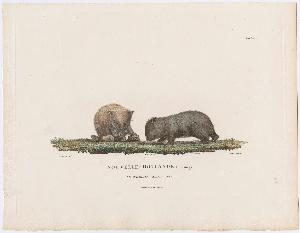Charles Alexandre Lesueur
Charles Alexandre Lesueur;Charles-Alexandre Lesueur
Place: Le Havre
Born: 1778
Death: 1846
Biography:
Charles Alexandre Lesueur was a French naturalist, artist, and explorer born on January 1, 1778, in Le Havre, France. He died on December 12, 1846, in the same city. Lesueur was a prolific natural-history collector, gathering many type specimens in Australia, Southeast Asia, and North America.
Early Life and Career
Lesueur's early life is not well-documented, but it is known that he developed an interest in natural history at a young age. He began his career as a naturalist and artist, collecting and describing numerous species of plants and animals. Lesueur's work took him to various parts of the world, including Australia, Southeast Asia, and North America.
Notable Works and Contributions
Lesueur was responsible for describing numerous species, including the spiny softshell turtle (Apalone spinifera), smooth softshell turtle (A. mutica), and common map turtle (Graptemys geographica). His work in natural history has had a lasting impact on the field, and his contributions are still recognized today. Lesueur's artistic talents were also notable, and he created many paintings and drawings of the species he encountered. Some of his notable works include paintings of the Musée Antoine Lécuyer (France), which can be found on https://Wikioo.org/@/Charles-Alexandre-Lesueur.
Legacy and Impact
Lesueur's legacy extends beyond his contributions to natural history. He is also remembered for his artistic talents, which have been recognized by the Musée des Beaux-Arts (Le Havre, France). The museum has a collection of his paintings, including La plage d'Ambleteuse, which can be found on https://Wikioo.org/Art.nsf/O/AQZBNS. Lesueur's work has also been recognized by other artists, including Camille Pissarro, who was a prominent figure in the Impressionist movement. Pissarro's paintings, such as Woman in the Garden (Saint-Adresse), can be found on https://Wikioo.org/@@/5ZKC28-Claude-Monet-Woman-in-the-Garden-(Saint-Adresse).
- Lesueur's work in natural history has had a lasting impact on the field.
- His artistic talents have been recognized by the Musée des Beaux-Arts (Le Havre, France).
- Lesueur's legacy extends beyond his contributions to natural history and art.
works by Lesueur can be found in various museums and collections, including the Musée Antoine Lécuyer (France) and the Musée des Beaux-Arts (Le Havre, France). His contributions to natural history and art are still recognized today, making him a notable figure in French history.


